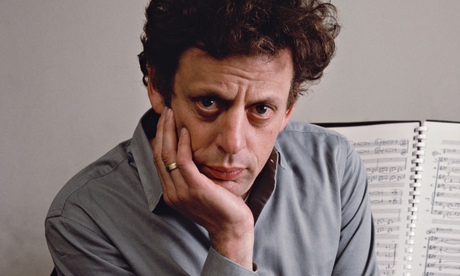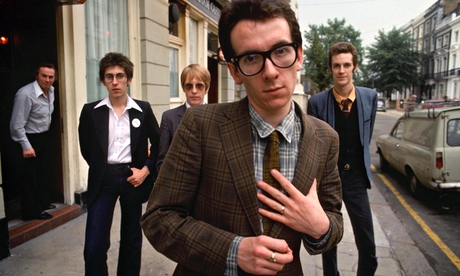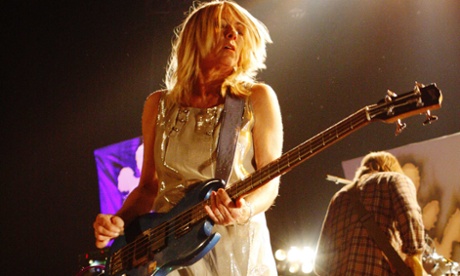At Channel 4 in the 1980s, one of my first jobs, Philip Glass would sometimes “drop by” when over from New York. His visits caused small havoc. One normally bookish colleague would all but glue herself to her desk, primping her hair and giggling uncharacteristically, in hope of a glimpse of her hero. Soon, having seen what the fuss was about, we all succumbed to her addiction.
Glass’s downtown glamour preceded him like an aromatic whiff ahead of a pipe smoker. This bright boy from Baltimore, who could only afford to become a fully professional composer at the age of 41, always had a cult following, no doubt helped by his big hair, melancholy eyes and warm demeanour, mixed with innocent yet rampant self-belief.
Being of other musical persuasions, I had no real clue who he was. Contemporary music had a chasm down the middle at that time. On one side were Glass, Steve Reich and Terry Riley, “American minimalists” who wrote pulsating rhythms and repetitive, slowly changing harmonies with long, overarching tunes. On the other, Pierre Boulez and composers of the European avant garde made gritty experiments in sound, shunned tunes and key signatures, and created mysteries with computers and electronics. I was of the Boulez persuasion.
A few more sightings and I was soon an avid Glass fan too. (Not yet being a music critic, actually hearing the music hadn’t come into the equation.) My first proper encounter with his unmistakable soundworld was Akhnaten, a critical disaster in New York but a triumph at English National Opera – which last week announced a new staging of the opera next season. It was beguiling and, in its sudden bursts into ravishing melody, rather shocking and wonderful. Hardcore musician friends were askance. Why chew bubble-gum music when you could grind your teeth on Stockhausen or Ligeti?
This aesthetic sectarianism was not as straightforward as now appears. Many composers crossed the barbed wire more than once trying to find their voice. Glass himself, as this lively, readable memoir shows, explored every kind of terrain before establishing his style in epics such as Einstein on the Beach and Music in Twelve Parts. As a boy helping out in his father’s record shop, he was so enthusiastic about Schoenberg that he over-ordered a new set of the string quartets – to his father’s chagrin. Surely, young Philip assumed, other folks in Baltimore would be as keen as he to sample Viennese atonality. The four sets took seven years to sell.
At the Juilliard conservatoire, living in unheated lofts in Lower Manhattan, Glass studied little but established the work routine that would sustain him for the next 40 years. Every day, unfailingly, from 10am to 1pm, he sat at his piano, whether he wrote a note or not. To pay his rent he worked as a builder, in a steel works, as a self-taught plumber (a worrying concept) and as a New York taxi driver (on one occasion he was nearly murdered. On another, asked by Martin Scorsese if he had seen his film Taxi Driver, he said no, he was out there being one).
Born in 1937, Glass was a child of the Beat generation. When eventually he had written enough music to win awards, he spent the funds on a BMW motorbike, inspired by Jack Kerouac’s recently published On the Road. John Cage was an influence, a key to the art of Jasper Johns, Robert Rauschenberg and Richard Serra then current in the New York of the late 1950s and early 1960s. So too were the writings of William Burroughs, Allen Ginsberg and Hermann Hesse.
Glass grew up to follow the hippy trail to Kathmandu, complete with ashram, yoga and yogis, Buddhism and much chanting of “om”. Whereas fellow travellers soon traded bells and beads for suits and ties, he remained dedicated to his studies. He worked with Ravi Shankar and educated himself in classical Indian dance (kathakali). For more than a decade he travelled to India every other year, steeping himself in the culture as well as the politics of peace. This would surface in his operas, notably Satyagraha (another ENO hit, revived many times), which pays tribute to Gandhi.
Though never a prodigy, Glass always knew he could achieve what he set out to do. Rigorous studies in Paris with the great French guru, Nadia Boulanger, exposed him to European styles and disciplines. His vivid account of those sessions is one of the best sections of the book. It was 1964. The 60s proper were about to ignite. He lived in a tiny studio in Montparnasse just around the corner from Samuel Beckett, with whom he would work. Truffaut had just made Jules et Jim. The Nouvelle Vague was in vogue. Glass was in his element.
This memoir, while hardly no-holds-barred, fills in many gaps, especially about his childhood and family in postwar east coast America. His grandparents spoke Yiddish. His librarian mother was the self-improver, urging her two sons and one daughter towards fulfilment through education. His father was steady in support. Little is said about the rift between father and son in later years, but the wound remains deep. Only two of his four wives feature: JoAnne Akalaitis, mother of his first two children, and Candy Jernigan, the love of his life, who died young. Two more children, born much later, are mentioned briefly. Friendships are celebrated, losses mourned, privacies respected. Aids, Woodstock, Vietnam, the film world, the art world, the jazz era of John Coltrane, Ornette Coleman, Charlie Parker: all spring to life in these pages. Philip Glass is a deft, quietly witty writer. Finding his own music – how to make it, where it comes from – is his first priority. “What does your music sound like?” he is often asked. “It sounds like New York City,” this generous-hearted, all-American composer replies.
Words Without Music will be Radio 4’s Book of the Week, starting 27 April. It is published by Faber (£22.50). Click here to order Words Without Music for £18











